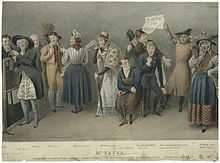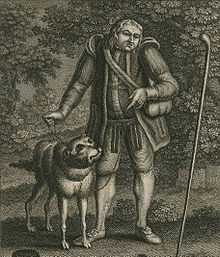Richard Yates (actor)
Richard Yates (c. 1706–1796) was an English comic actor, who worked at the Haymarket Theatre and Drury Lane among others, appearing in David Garrick's King Lear. He also worked in theatre management, and set up the New Theatre in Birmingham in 1773. Both his first wife, Elizabeth Mary (maiden name unknown, died in 1753) and Mary Anne Graham (1728–1787 - married in 1756) were actresses.

Life
Born about 1706, he played in Henry Fielding's Pasquin at the Haymarket when it was first performed. In 1737–9, at Covent Garden, he was seen in a number of parts.[1] On 4 September 1739 he appeared at Drury Lane as Jeremy in Love for Love, and played other comic parts.[2] At Goodman's Fields he appeared on 18 October 1740 as Antonio in Venice Preserved, playing further parts during the season.[3] For his benefit and that of Mrs. Elizabeth Yates, his first wife (about whom little is known) who played at this time small parts such as Emilia in The Winter's Tale, and was the Duchess of York on David Garrick's first appearance on the stage, he attempted Lovegold in The Miser, in the style of Benjamin Griffin.[4]

Richard Yates is believed to have been the first Autolycus and Clown in All's well that ends well since 1660. He was on 9 November 1741 the original Mrs. Jewkes in James Dance's stage adaptation of the novel Pamela; or, Virtue Rewarded, and on 30 November the original Dick in Garrick's Lying Valet, subsequently taking Sharp in the same piece.[5] On 18 September 1742 he reappeared at Drury Lane, where he remained until 1767.[6] He was the original Motley in The Astrologer by James Ralph on 3 April 1744; Sir Robert Belmont in Edward Moore's The Foundling, 13 February 1748; Melchior in Moore's Gil Blas, 2 February 1751; and Puff in Samuel Foote's Taste, 11 January 1752.[4]
In 1753–4 Mrs. Graham, subsequently Mary Ann Yates, joined the company, and Yates became closely associated with her. They seem to have been married in the autumn of 1756. In his later years he was reputedly engaged mainly on her account. He was, 30 April 1754, the original Grumbler.[7] Yates had previously, 18 March, been the first Grumio in Garrick's Catharine and Petruchio. He was the first Wingate in Arthur Murphy's The Apprentice, 2 January 1756.[8] He had at some time, probably around 1760, set up with Edward Shuter and others a booth at Bartholomew Fair, playing Pantaloon to Shuter's Harlequin. Yates was a pantomimist frequently himself seen as Harlequin.[4]
Under the management of Thomas Harris, John Rutherford, George Colman the Elder, and William Powell, King made his first appearance at Covent Garden on 31 October 1767 as Major Oakly, in Colman's The Jealous Wife, and was the original Prig and Frightened Boor in Royal Merchant, an opera based by Thomas Hull on the Beggar's Bush on 14 December. At this house he played Cloten, Florimond in Edgar and Emmeline by John Hawkesworth, Sir Gilbert Wrangle in The Refusal, Brass, and Lucio. He was the original Sir Benjamin Dove in Richard Cumberland's Brothers, 2 December 1769; and Stanley in An Hour before Marriage, 25 January 1772. On 11 January 1773 he appeared at Edinburgh in Othello, and played also Captain Brazen, Touchstone, and Shylock. On 5 May 1775 he reappeared at Drury Lane as Scrub, but does not seem to have acted again that season.[9] From 1780 to 1782 he was resting. On 6 December 1782 he made, as Sir Wilful Witwoud in The Way of the World, a first appearance at Covent Garden in ten years, and was on 28 January 1783 the first Sir Edmund Travers in Cumberland's Mysterious Husband.[4]

Last years
Yates from then no longer worked in London; he was engaged with his wife in Edinburgh 1784–5, and probably acted with her in York during her return journey on 21 April 1785. He retired with a handsome competence.[4]
On 21 April 1796, at his house, Stafford Row, Pimlico, Yates died, it is said, in a fit of rage at being unable to obtain eels for dinner. He was buried at his own request by his second wife in the chancel of Richmond church. He was considered unequalled in Shakespearean clowns.[4]
Notes
- ↑ As Wart in the Second Part of King Henry IV, Mad Welshman in the Pilgrim, Sir Joseph Wittol in the Old Bachelor, and the page in Don Quixote.
- ↑ They included Pantaloon in Harlequin Shipwrecked, Whisper in Busy Body, Quaint in Æsop, fourth citizen in Julius Cæsar, Squire Freehold in Robin Goodfellow, Finder in Double Gallant, Pistol in Merry Wives of Windsor and Second Part of Henry IV, Dapper in The Alchemist, Sly in Love's Last Shift, Rasor in Provoked Wife, Gripus in Amphitryon, Stuttering Servant in Pilgrim, and Hellebore in Mock Doctor.
- ↑ Daniel in Oroonoko, Brazen in The Recruiting Officer, Roderigo, Coupee in Virgin Unmasked, Sir Philip Modelove in Bold Stroke for a Wife, Ben in Love for Love, Truman in George Barnwell, Squire Richard in Constant Couple, Sir Hugh Evans, Teague in Committee, Lory in The Relapse, Hecate, Autolycus, Scrub in The Beaux' Stratagem, Filch in The Beggars' Opera (in which he danced a hornpipe), Gregory in Mock Doctor, Poe in Timon of Athens, Clown in All's well that ends well, and others.
- ↑ 4.0 4.1 4.2 4.3 4.4 4.5
 "Yates, Richard (1706?-1796)". Dictionary of National Biography. London: Smith, Elder & Co. 1885–1900.
"Yates, Richard (1706?-1796)". Dictionary of National Biography. London: Smith, Elder & Co. 1885–1900. - ↑ Among other parts taken in this second season at Goodman's Fields were Don Lewis in ‘Love makes a Man,’ Old Mirabel in ‘Inconstant,’ Petulant in ‘Way of the World,’ and Major Rakish in the ‘Schoolboy.’
- ↑ Comic characters he played during this period include: Kastril in the ‘Alchemist’; Setter in ‘Old Bachelor,’ Old Woman in ‘Rule a Wife and have a Wife,’ Marplot, Schoolboy, Numps in ‘Tender Husband,’ Foigard in ‘Beaux' Stratagem,’ Sir Polydorus Hogstye in ‘Æsop,’ Soto in Fletcher's ‘Woman Pleased,’ Peachum, Sir Francis Wronghead, Sir Paul Plyant, Gomez, Sparkish in ‘Country Wife,’ Grizzle in ‘Tom Thumb,’ Old Laroon in ‘Debauchees,’ Vellum, Tattle, Sir Toby Tickle in ‘She Gallant,’ Savil in ‘Scornful Lady,’ Clown in ‘Twelfth Night’ and ‘Measure for Measure,’ Crack in ‘Sir Courtly Nice,’ Pinac in ‘Wild Goose Chase,’ Shylock, Puff and Fribble in ‘Miss in her Teens,’ Pistol, Don Manuel, Fluellen, Sir Jasper Fidget in ‘Country Wife,’ Scaramouch in ‘Emperor of the Moon,’ Sir William Belfond in ‘Squire of Alsatia,’ Sir Francis Gripe, Trinculo, Sir Wilful Witwoud, Alphonso in ‘Pilgrim,’ Malvolio, Touchstone in ‘Eastward Ho’ and in ‘As you like it,’ Brainworm in ‘Every Man in his Humour,’ Morose in ‘Silent Woman,’ Scapin, Cadwallader, Shallow, Dogberry, Bobadil, Justice Greedy, Falstaff, Launce, Bottom, and Lord Chalkstone.
- ↑ This was in a work altered from The Grumbler of Charles Sedley, itself translated from the comedy Le Grondeur of David Augustin de Brueys).
- ↑ Other parts were O'Clabber in Smollett's ‘Reprisal,’ 22 Jan. 1757; Vamp in Foote's ‘Author,’ 5 Feb.; Dizzy in Garrick's ‘Modern Fine Gentleman,’ afterwards called ‘Male Coquette,’ 24 March; Barnacle in Garrick's ‘Gamesters,’ 22 Dec.; Quidnunc in Murphy's ‘Upholsterer,’ 30 March 1758; Feeble in Hill's ‘Rout,’ 20 Dec.; Sir Charles Clackit in the ‘Guardian,’ 3 Feb. 1759; Captain Hardy in Mozeen's ‘Heiress,’ 21 May; Philip in ‘High Life below Stairs,’ 31 Oct.; Snip in Garrick's ‘Harlequin's Invasion,’ 31 Dec.; played a part in Mrs. Clive's ‘Every Woman in her Humour;’ was, 20 March 1760, the first Honeycombe in Colman's ‘Polly-Honeycombe,’ 5 Dec.; Sir Bashful Constant in Murphy's ‘Way to keep him,’ enlarged to five acts on 10 Jan. 1761; Major Oakly in Colman's ‘Jealous Wife,’ 12 Feb.; Sir John Restless in Murphy's ‘All in the Wrong,’ 15 June; Old Philpot in Murphy's ‘Citizen,’ 2 July; Old Mask in Colman's ‘Musical Lady,’ 6 March 1762; Sir John Woodall in Mrs. Sheridan's ‘Dupe,’ 10 Dec. 1763; Hobbinol in Lloyd's ‘Capricious Lovers,’ 28 Nov. 1764; Sir William Loveworth in Murphy's ‘Choice,’ 23 March 1765; Sterling in Garrick and Colman's ‘Clandestine Marriage,’ 20 Feb. 1766; Slip in ‘Neck or Nothing,’ attributed to Garrick, 18 Nov.; and Freeport (the merchant) in Colman's ‘English Merchant,’ 21 Feb. 1767.
- ↑ Next season he played for the first time Captain Otter in ‘Epicœne,’ and was the first Hargrave in Mrs. Cowley's ‘Runaway,’ 15 Feb. 1776. He was subsequently Fondlewife in ‘Old Bachelor,’ and Clown in the Winter's Tale, and was on 8 May 1777 the original Sir Oliver Surface in the ‘School for Scandal.’
External links
- "Yates, Richard". Oxford Dictionary of National Biography (online ed.). Oxford University Press. doi:10.1093/ref:odnb/30197. (Subscription or UK public library membership required.).
- Attribution
![]() This article incorporates text from a publication now in the public domain: "Yates, Richard (1706?-1796)". Dictionary of National Biography. London: Smith, Elder & Co. 1885–1900.
This article incorporates text from a publication now in the public domain: "Yates, Richard (1706?-1796)". Dictionary of National Biography. London: Smith, Elder & Co. 1885–1900.
|